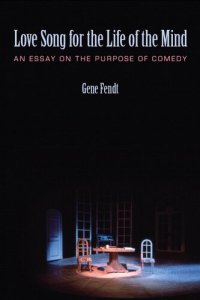
Ebook: Love Song for the Life of the Mind: An Essay on the Purpose of Comedy
Author: Gene Fendt
- Year: 2007
- Publisher: The Catholic University of America Press
- Edition: Illustrated
- Language: English
- pdf
Love Song for the Life of the Mind develops the view of comedy that, the author argues, would have been set out in Aristotle's missing second book of Poetics. As such it is both a philosophical and a historical argument about Aristotle; and the theory of comedy it elucidates is meant to be trans-historically and trans-culturally accurate.
After a preface that sets out the primacy and centrality of mimesis for both individual and societal development, the argument about the dramatic arts begins from a crux in Aristotle's extant analysis of tragedy where he seems to contradict himself on the kind of plot that is the best for tragedy. Gene Fendt argues, against a variety of formalist and intellectualist interpretations, that the only way out of the problem is through reference to the final cause of tragedy as a catharsis of pity and fear. This fundamental tenet of Aristotle's theory of tragedy, the author maintains, is the first clue to understanding comedy, which also must be defined not formally but in reference to its final cause. Fendt argues that the final cause of comedy must be a catharsis of eros and sympathy. In the course of his argument he shows how that catharsis is made available to the excessive, the deficient, and the virtuous members of the audience in Aristophanes' Acharnians, Shakespeare's As You Like It and Stoppard's Arcadia.
The book closes by exploring how this Aristotelian argument might underlie the Symposium's claim that the fine artist of tragedy should also create fine comedy. The book will appeal both to those interested in Aristotle and those interested in dramatic theory and criticism.
ABOUT THE AUTHOR:
Gene Fendt, professor of philosophy at the University of Nebraska-Kearney, is author of several books including Is Hamlet a Religious Drama?: An Essay on a Question in Kierkegaard, Platonic Errors: Plato, A Kind of Poet, Works of Love?: Reflections on Works of Love, and For What May I Hope? Thinking with Kant and Kierkegaard.
PRAISE FOR THE BOOK:
"Fendt's book is impressive and will appeal to scholars with an interest in Aristotle or in aesthetics and literary criticism. Certainly, it is not an introductory-level book. Summing up: Recommended." ― M.W. Sontag, Choice
"[I]n Love Song for the Life of the Mind, Fendt sees something amazing in Aristotle, a vision of comedy as fully the equal of tragedy. . . . [Fendt employs] the techniques that have made his readings of "the old masters" so insightful and contemporary. . . . The argument in Gene Fendt's Love Song for the Life of the Mind will reorient scholarly debate over Aristotle's Poetics." ― H. L. Hix, Southern Humanities Review
"Fendt elegantly reconstructs Aristotle's lost thoughts on comedy, solves the conundrum at the end of Plato's Symposium, and with serious humor articulates the importance and beauty in the works of Plato, Shakespeare, Aristophanes, and Stoppard. Fendt's engaging style may be the best and most important part of his book; just as a play's effect cannot be reduced to a moral message, so a bare list of his conclusions (such as one might find in a review) would hardly hint at the healthy mental pleasures that one experiences in following him to those conclusions." -Faith and Philosophy